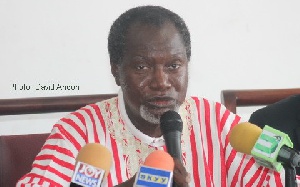 Nii Allotey Brew-Hammond - National Chairman of the PPP
Nii Allotey Brew-Hammond - National Chairman of the PPP
Progressive People’s Party (PPP) says it will go to the High Court to seek redress over the state’s refusal to implement the compulsory aspect of the Free Compulsory Universal Basic Education (FCUBE) policy enshrined in the 1992 Constitution.
At a press conference yesterday at the party’s Asylum Down headquarters in Accra, the PPP reiterated its commitment to the full implementation of the FCUBE policy.
Addressing the media, National Secretary of PPP, Murtala Mohammed, indicated that the party will continue to stand on Article 25(1) (a) of the 1992 Constitution which states that: “All persons shall have the right to equal educational opportunities and facilities.
“With a view to achieving the full realisation of that right– basic education shall be free, compulsory and available to all,” he added.
The PPP’s chief scribe stressed that Ghanaians would feel disappointed if as a party it fails to use the court to ensure the implementation of the FCUBE policy hence their decision to go to the High Court over the issue.
He explained that it was sad to see many children of school-going age “roaming on our streets instead of being in school.”
“This situation has come about as result of failure on the part of successive administrations since Ghana returned to constitutional democratic dispensation,” he lamented.
“We the PPP believe that education is key to personal and national development than any natural resources, and that is the more reason why we are heading to the High Court in the coming weeks, to seek redress in accordance with the Supreme Court direction which suggested that we go to the High Court for the enforcement of the Article 25(1) (a).
…And we hope our efforts to bring good to the people of Ghana will not be in vain as we go to the High Court to pursue the implementation of the FCUBE policy under the 1992 Constitution,” Mr. Murtala added.
It would be recalled that the PPP in May 2015 went to the Supreme Court with the same issue but Ghana’s apex court declined to hear the application filed by the party to compel government to enforce the FCUBE policy.
The seven-member panel of the SC led by Justice Julius Ansah opined that the matter as well as the relevant provisions relied upon did not occasion any ambiguity to require an interpretation.
The apex court however, said the enforcement of the provisions the party referred to belonged to the High Court.